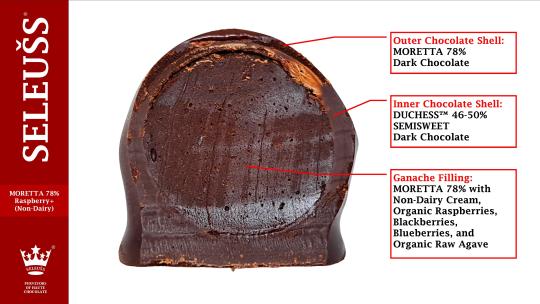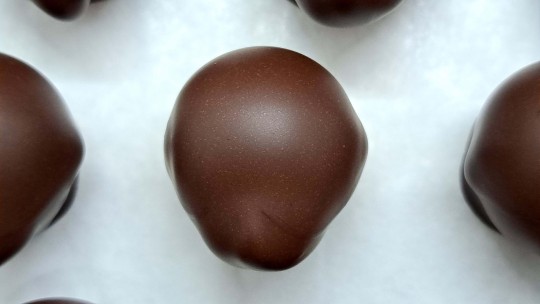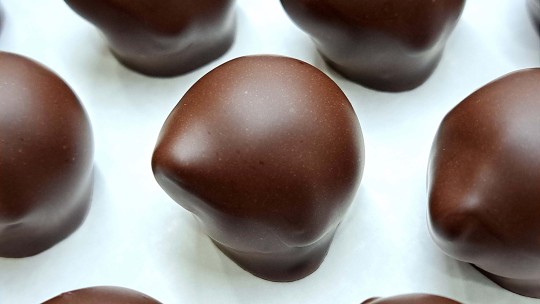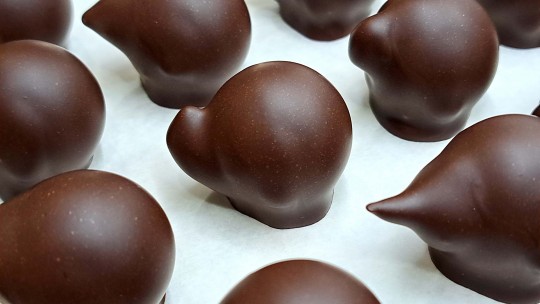#organic agave nectar
Text
Agave Nectar Manufacturer Nectave to Expand Capacity for Higher Exports
One of the top players in the sweetener industry, Nectave is expanding its capacity and will focus more on bulk sales of Agave nectar and Agave syrup. For More information Please Visit - https://qr.ae/psgBum
0 notes
Text

[ID: Three rectangular, dark golden brown pastries on a plate. The pastries are filled with a deep golden curd, drizzled with white icing, and garnished with sprigs of fresh thyme and curls of lemon peel. A lemon wedge sits to the left of the plate. End ID.]
Puff pastry tarts with lemon-thyme curd
Flaky, crispy puff pastry is topped with a homemade lemon curd in this classic mini-tart recipe, perfect for breakfast, brunch, tea, or dessert. The savory pastry and the brightness of the lemon cut the sweetness of the curd, while fresh thyme adds a bit of minty, peppery complexity.
Recipe under the cut!
Patreon | Tip jar
Makes 12 pastries.
Ingredients:
For the pastry:
1 batch puff pastry
For the curd:
1/2 cup granulated sugar
1/2 tablespoon agar agar flakes (or 1/2 tsp agar powder)
1/4 cup fresh lemon juice (about 2 lemons)
Zest of two lemons (about 1/2 Tbsp)
1/2 cup (120g) non-dairy margarine
2 sprigs fresh thyme leaves, removed from stems and minced
Pinch salt
Crack of black pepper (optional)
Replace the agar with 1 Tbsp of cornstarch in a pinch.
For the 'egg' wash:
1 Tbsp non-dairy milk
1 Tbsp agave nectar
Instructions:
For the curd:
1. Juice and zest the lemons. Scrub lemons under running water for a few seconds to clean their peels (especially if they're not organic). Use a surform tool to zest the lemons, or use a vegetable peeler to remove just the top layer of the peel (trying not to take too much of the white pith) into strips, and then mince.
Press and roll the lemons firmly against a hard surface to make juicing easier, then cut them in half and juice with a reamer or citrus press. Pass the juice through a fine sieve to remove seeds and fibers.
2. Make the curd. Whisk together sugar, agar or cornstarch, lemon zest, thyme, and salt in a small pot. Add lemon juice and stir to combine. Add margarine.
3. Bring curd mixture to a low boil over medium heat, whisking constantly. Lower the heat to medium low for and continue to cook, stirring often, or 10-30 minutes until thickened.
You will know it is thick enough when you can run a finger across the back of a spoon dipped in the curd, and the trail your finger made does not collapse back into the curd but remains visible. Keep in mind that it will thicken further as it cools!
4. Remove curd from the pot into a bowl and refrigerate until cold.
For the wash:
Whisk ingredients together in a small bowl. Set aside.
To assemble:
1. Cut your puff pastry in half and refrigerate the half you're not working with. Roll the other half out into an 8 x 12” (20 x 30cm) rectangle, then cut it into 6 4” (10cm) squares.
2. With a small, sharp knife, score the edges of each square to form a smaller square about two inches in diameter in the center of each pastry. Be careful not to cut all the way through the pastry—you just want to create a little bit of separation while leaving the square in one piece.

3. Refrigerate the dough squares you have formed and repeat with the other half of the puff pastry.
4. Brush the pastry squares with the 'egg' wash mixture and bake in a preheated oven at 400 °F (205 °C) for 10-15 minutes, until golden brown.
5. Using a sharp knife, gently trace over the previously scored squares to re-separate; press each central square down, leaving the outer borders puffy and elevated.

6. Add a dollop of lemon curd to each square and garnish with thyme, mint, or candied lemon peel, or drizzle with a mixture of powdered sugar and non-dairy milk.
Note that non-vegan recipes for puff pastry tarts with fruit curd often instruct you to bake them, for some or all of the cooking time, with the curd already added—with an eggless curd, I found that this resulted in the curd bubbling up and spilling over the sides of the pastries, then burning to the bottom.
173 notes
·
View notes
Photo


Lesser Long-nose Bat (Leptonycteris yerbabuena)
With tongues as long as their bodies, these pollinators are able to sip on the nectar of cacti and agave flowers.
These desert nectar-feeding bats are true heroes in maintaining fragile desert ecosystems in the southwestern United States and Mexico. They are the primary night pollinators of both the organ pipe and saguaro cactus. In turn, growing up to 50 feet in height, the cacti provide important nesting and perching sites for a variety of birds, such as red-tailed hawks, elf owls, Gila woodpeckers, and gilded flickers.
The National Park Service promotes bat conservation through research, educational projects, and working with multiple private, non-profit, and federal and state agency partners.
Next time you see beautiful saguaro blooms or fruit this summer, make sure to thank a bat!
NPS Photos
via: Saguaro National Park (Arizona)
115 notes
·
View notes
Text
Ayoo just to preempt the inevitable dumb takes we’re about to start seeing;
I am PRO-WOOL
I am PRO-LEATHER
I am PRO-BEES
Fuck the idea of replacing durable, sustainable animal products with cheap, flimsy plastic that doesn’t bio-degrade. Agave nectar and other artificial sweeteners are expensive, labor-intensive, and destroy the environment to be farmed.
Do not buy into pernicious marketing campaigns pushed by dickhead organizations trying to stay relevant, like PETA.
57 notes
·
View notes
Text
Out of Sight, Out of Mind: The Unexpected Importance of Bats, Past and Present

Throughout history, bats have been associated with vampires and the macabre, but did you know that bats also play a crucial role in the history of agriculture?
Many bats help to reduce crop damage by preying on pest and their droppings “Guano” are a rich source of fertilizer used through history to increase crop yields. Bats are considered to be farmers allies. Some bats also play an important role in pollinating crops. Several species of bats feed on the nectar of flowers, and as they move from one flower to another, they transfer pollen, helping to fertilize the plants. This is particularly important for plants that rely on bat pollinators, such as agave, which is used to produce tequila.
Guano is a valuable natural fertilizer that has been used by humans for centuries. It is rich in nitrogen, phosphorus, and potassium, which are essential nutrients for plant growth. In fact, bat guano was one of the earliest natural fertilizers used in agriculture, and it is still used today by organic farmers and gardeners. However, over time, the collection of bat guano for commercial use has had negative impacts on bat populations.
Guano is also important for the preservation of caves. It provides a nutrient source for the ecosystem, supporting the growth of bacteria and fungi that break down organic matter and recycle nutrients. In addition, bat guano can help to stabilize cave sediments and prevent erosion, which is important for the preservation of archaeological and paleontological sites.
Guano is a very slow to recover natural resource. Excessive harvesting for agriculture has disrupted the delicate balance of the ecosystem in many places, leading to a decline in the biodiversity that supported bat populations. In turn, the benefits from those bats have disappeared.
Bats provide a valuable ecosystem service by controlling pests and fertilizing crops, their conservation should be a priority for farmers and policymakers. By adopting bat-friendly farming practices, such as providing bat roosts and protecting bat habitats, farmers can help to ensure the continued success of agriculture, while also supporting the conservation of these important animals.
As it comes to renewable resources, it’s to be responsible with our consumption. The cascading effects of over consumption are complicated and often unexpected. Like with bats, our lives are tied to the healthy functioning of the ecosystem in ways we often don’t think of. Small acts, whether good or bad, can have profoundly larger impacts.
#life after life#conservation#green burial#sustainability#symbiosis#biodiversity#bats#farming#agriculture#plants#pollinators#guano#caves#cemetery#death positive
14 notes
·
View notes
Note
Hey is there a specific tequila that's really good in strawberry margaritas? or does it even matter? I've just been told to stick to the clear ones. thanks!
For strawberry margaritas I would also probably stick to a blanco/silver one but you can easily get away with doing a reposado, but you'd have to find a repo that hasn't reached the point of aging where you get into a real sickening caramel sweetness (and some reposados they add agave nectar to them to make them sweeter i.e. shit like Clase Azul, but clase azul is mega expensive sipping tequila anyways so you shouldn't have to worry about that). Probably a 3-4 month aged repo would be fine -- if you find a tequila that has an age statement like that on the bottle those are best. Lately I've been liking stuff like the 3 Amigos Organic Blanco (the organic one. Not the OG one but the organic one) and Espolòn blanco. Milagro is another great one. If you go with a reposado the Milagro reposado is a good one for Strawberry Margaritas in particular.
If I had to choose one overall it'd be La Gritona though. But because I work at a certain National Wine and Spirits Store Chain That I Shant Name At The Moment I also frequently use El Padrino blanco. For like everything mixing tequila-wise. I'm unfortunately a pretty big El Padrino shill for people who don't like a lot of agave vegetalness in their blanco tequila (even though it's supposed to have that, that's how normal tequila tastes). Legado is another one from that chain that is pretty good for mixing and does taste like a normal tequila with a nice balance of that vegetal agave and the agave sweetness notes.
So to sum up:
Stick mainly to blanco/silver tequila, but if you want, use a younger reposado.
La Gritona, 3 Amigos Organic Blanco, Espolòn, Milagro are the best one's I'd suggest for a really quality margarita.
If You Are At The Certain Store That Sells These, try El Padrino and Legado as well, El Padrino if you want something smoother.
You generally shouldn't have to spend more than $35 for a good blanco tequila imo also. Just a heads up.
4 notes
·
View notes
Text
Distilled water, lavender flowers, lemons, organic agave nectar, butterfly pea flower
4 notes
·
View notes
Text
Natural Alternative Sweeteners Market Insights: Comprehensive Global Forecast (2023-2032)

The global demand for natural alternative sweetener products was valued at USD 3154.20 million in 2023 and is expected to reach USD 5606.66 million in 2032, growing at a CAGR of 6.60% between 2024 and 2032.
The natural alternative sweeteners market is poised for substantial growth, fueled by rising consumer awareness about the health risks associated with excessive sugar consumption and a growing preference for natural and organic products. As concerns about obesity, diabetes, and other sugar-related health issues intensify, consumers are increasingly seeking healthier alternatives to traditional sugar. Natural sweeteners, derived from plant sources, offer a viable solution, providing sweetness without the high calorie content and adverse health effects of refined sugar. Key natural sweeteners gaining popularity include stevia, monk fruit extract, erythritol, and agave nectar, each bringing unique benefits and applications across various food and beverage products.
Stevia, extracted from the leaves of the Stevia rebaudiana plant, has become a prominent player in the market due to its zero-calorie content and high sweetness potency, which is 200-300 times sweeter than sugar. Its stability under heat and acidic conditions makes it suitable for a wide range of applications, from baked goods to beverages. Similarly, monk fruit extract, known for its intense sweetness and lack of aftertaste, is being increasingly used in both commercial and homemade food products. Erythritol, a sugar alcohol derived from fruits and fermented foods, offers a sugar-like taste and texture with minimal calories, making it a popular choice for low-calorie and ketogenic diets.
The market's growth is also driven by the expanding consumer base adhering to clean label trends, which prioritize ingredients perceived as natural and minimally processed. Food and beverage manufacturers are responding to this demand by reformulating products to include natural sweeteners, thereby attracting health-conscious consumers. Additionally, regulatory bodies in various regions are endorsing the use of these sweeteners, further propelling market expansion. For instance, the U.S. Food and Drug Administration (FDA) and the European Food Safety Authority (EFSA) have approved the use of several natural sweeteners, boosting their acceptance and use in mainstream food production.
Natural alternative sweeteners are often considered healthier than traditional sugar due to several key benefits, though the extent of their health advantages can vary depending on the type of sweetener and individual health conditions. Here’s a detailed comparison:
Lower Caloric Content
Natural Alternative Sweeteners: Many natural sweeteners, such as stevia and monk fruit extract, contain little to no calories. This can be beneficial for weight management and reducing overall calorie intake, which is particularly important for individuals trying to lose weight or manage obesity.
Traditional Sugar: Regular sugar (sucrose) is high in calories, contributing to weight gain and increasing the risk of obesity when consumed in excess.
Glycemic Index
Natural Alternative Sweeteners: Natural sweeteners like stevia, erythritol, and monk fruit have low or zero glycemic index (GI), meaning they do not cause significant spikes in blood glucose levels. This makes them suitable for people with diabetes or those looking to maintain stable blood sugar levels.
Traditional Sugar: Sugar has a high glycemic index, leading to rapid increases in blood glucose and insulin levels, which can be problematic for diabetics and contribute to insulin resistance over time.
Impact on Dental Health
Natural Alternative Sweeteners: Some natural sweeteners, such as xylitol, even promote dental health by reducing the risk of tooth decay. Xylitol, for example, can inhibit the growth of bacteria that cause cavities.
Traditional Sugar: Sugar is a major contributor to tooth decay and cavities. Bacteria in the mouth feed on sugar, producing acids that erode tooth enamel.
Nutritional Benefits
Natural Alternative Sweeteners: Certain natural sweeteners, like honey and maple syrup, contain trace amounts of vitamins, minerals, and antioxidants. However, these benefits are often minimal and should not be the primary reason for their consumption.
Traditional Sugar: Sugar provides quick energy but lacks nutritional value, offering no vitamins or minerals.
Health Risks
Natural Alternative Sweeteners: While generally considered safe, some natural sweeteners can have side effects or interactions. For instance, consuming large amounts of sugar alcohols like erythritol and xylitol can cause digestive issues such as bloating and diarrhea in some individuals.
Traditional Sugar: Excessive sugar intake is linked to numerous health problems, including obesity, type 2 diabetes, heart disease, and metabolic syndrome. It can also contribute to fatty liver disease and inflammation.
Taste and Use in Foods
Natural Alternative Sweeteners: Some natural sweeteners may have aftertastes or different sweetness profiles compared to sugar, which can affect their use in certain recipes. However, many people find them suitable substitutes once they adjust to the taste.
Traditional Sugar: Sugar provides a familiar taste and texture that is difficult to replicate exactly with alternative sweeteners, which is why it remains widely used in cooking and baking.
Key Players:
Tate & Lyle PLC
Ingredion Incorporated
Pure Circle Ltd.
Sweetly Stevia USA
Fooditive B.V.
The Real Stevia Company
Stevia Biotech Pvt. Ltd.
DuPont
Cargill Inc.
GLG Life Tech Corporation
More About Report- https://www.credenceresearch.com/report/natural-alternative-sweeteners-market
The natural alternative sweeteners market is evolving rapidly, driven by innovative trends that cater to increasing consumer demand for healthier and more natural food options. Here are some key innovative trends shaping the market:
1. Blended Sweeteners
Blended sweeteners combine two or more natural sweeteners to enhance sweetness profiles and functional benefits. These blends are designed to mimic the taste and texture of sugar more closely, offering a better consumer experience. For instance, combining stevia with erythritol or monk fruit can reduce the aftertaste sometimes associated with stevia alone and improve the overall sweetness.
2. Enhanced Flavor Profiles
Manufacturers are investing in R&D to improve the flavor profiles of natural sweeteners. This includes reducing the bitterness or aftertaste often associated with some sweeteners like stevia. Advanced extraction and purification techniques are being used to produce high-purity sweeteners with better taste.
3. Functional Sweeteners
There is a growing trend towards functional sweeteners that offer additional health benefits beyond sweetness. For example, prebiotic sweeteners like inulin and oligosaccharides not only provide sweetness but also promote gut health by supporting beneficial gut bacteria. These sweeteners are increasingly being incorporated into health-focused food products.
4. Organic and Non-GMO Certifications
With rising consumer awareness about the origins of their food, there is a significant push towards organic and non-GMO certified sweeteners. These certifications assure consumers that the sweeteners are free from synthetic pesticides, herbicides, and genetically modified organisms, aligning with the clean label trend.
5. Innovative Applications in Food and Beverages
Natural alternative sweeteners are being used in a wider range of food and beverage products. This includes not just traditional applications like baked goods and beverages, but also emerging categories such as plant-based foods, sports nutrition, and dairy alternatives. The versatility of these sweeteners allows manufacturers to cater to diverse dietary needs and preferences.
6. Smart Sweetening Systems
Advancements in technology are leading to the development of smart sweetening systems that allow precise control over sweetness levels. These systems use data analytics and AI to optimize the use of sweeteners in recipes, ensuring consistent taste and quality. Such innovations are particularly useful for large-scale food production where maintaining consistency is crucial.
7. Sustainability and Ethical Sourcing
Consumers are increasingly concerned about sustainability and ethical sourcing. Companies are responding by ensuring their natural sweeteners are sourced sustainably and support fair trade practices. This includes working directly with farmers to ensure sustainable farming practices and providing fair compensation.
8. Expansion of Product Offerings
The market is witnessing an expansion in product offerings, with companies introducing new forms of natural sweeteners such as liquid, powdered, and granulated formats. This diversification allows consumers and food manufacturers more flexibility in how they use these sweeteners in different culinary applications.
9. Technological Advancements in Production
Technological advancements in the extraction and production processes of natural sweeteners are making them more cost-effective and accessible. Innovations such as enzyme-based extraction and fermentation are improving yield and purity, reducing costs, and making natural sweeteners more competitive with traditional sugar.
10. Personalized Nutrition
The rise of personalized nutrition is influencing the natural sweeteners market. Consumers are looking for sweeteners that align with their specific dietary needs, such as keto, paleo, or diabetic-friendly diets. Companies are developing targeted products to meet these personalized nutrition requirements, offering customized solutions.
Segmentation:
By Type of Sweetener
Stevia
Monk Fruit Extract (Luo Han Guo)
Erythritol
Xylitol
Allulose
Agave Nectar
Coconut Sugar
Maple Syrup
Honey
By Application
Food and Beverages
Dietary Supplements
Personal Care Products
Pharmaceuticals
By End-User
Food and Beverage Manufacturers
Retailers and Distributors
Foodservice Industry
Households and Consumers
Browse the full report – https://www.credenceresearch.com/report/natural-alternative-sweeteners-market
Browse Our Blog: https://www.linkedin.com/pulse/natural-alternative-sweeteners-market-forecast-analysis-7xzqf
Contact Us:
Phone: +91 6232 49 3207
Email: [email protected]
Website: https://www.credenceresearch.com
0 notes
Text
Exploring Five Key Ingredients: From Natural Humectants to Flavor Enhancers
In the realm of food science and culinary arts, the quest for innovative ingredients that enhance flavor, texture, and shelf life while meeting consumer demand for natural and healthier options is a perpetual journey. Among the myriad of ingredients that grace the tables and shelves of modern kitchens, five stand out for their diverse applications and unique properties: Natural Humectant, control moisture agents, flavor enhancers, soy lecithin replacements, and resistant dextrin.
Natural Humectant:
Natural humectants are substances that attract and retain moisture, helping to maintain the moisture content of food products and prevent them from drying out. Unlike synthetic humectants such as propylene glycol and glycerin, which are derived from petrochemicals, natural humectants are derived from plant-based sources such as honey, maple syrup, and agave nectar. These natural sweeteners not only provide sweetness but also impart a subtle flavor profile and contribute to the overall texture and mouthfeel of the product. Additionally, natural humectants offer the added benefit of being perceived as healthier and more wholesome by consumers, making them a popular choice for manufacturers seeking to clean up their ingredient labels and appeal to health-conscious consumers.
Control Moisture:
Control Moisture agents play a crucial role in food processing and preservation, helping to regulate the moisture content of food products and extend their shelf life. By absorbing excess moisture or preventing moisture loss, control moisture agents help maintain the texture, appearance, and quality of food products, reducing the risk of spoilage and waste. Common control moisture agents include silica gel, calcium chloride, and modified starches, which are used in a variety of applications ranging from baked goods and snacks to meat and poultry products. As consumers increasingly demand clean label ingredients and natural alternatives, manufacturers are exploring innovative control moisture agents derived from plant-based sources such as cellulose, pectin, and xanthan gum.
Flavor Enhancer:
Flavour Enhancer are ingredients that amplify and enhance the taste and aroma of food products, making them more appealing to consumers. While traditional flavor enhancers such as monosodium glutamate (MSG) have come under scrutiny for their potential health risks, manufacturers are turning to natural alternatives to meet consumer demand for clean label products. Natural flavor enhancers such as yeast extracts, hydrolyzed vegetable proteins, and mushroom extracts are gaining popularity for their ability to deliver umami-rich flavors without the need for artificial additives. Additionally, ingredients such as sea salt, herbs, and spices are valued for their ability to add depth and complexity to dishes while enhancing overall flavor profiles.
Soy Lecithin Replacement:
Soy Lecithin Replacement, a common emulsifier derived from soybeans, is widely used in food production to improve texture, stability, and shelf life. However, concerns about soy allergies and genetically modified organisms (GMOs) have prompted manufacturers to seek alternative emulsifiers that offer similar functionality without the drawbacks of soy lecithin. One promising alternative is sunflower lecithin, which is extracted from sunflower seeds and offers comparable emulsifying properties to soy lecithin. Sunflower lecithin is free from allergens and GMOs, making it a safer and more sustainable option for manufacturers looking to clean up their ingredient labels and appeal to health-conscious consumers.
Resistant Dextrin:
Resistant dextrin, also known as resistant maltodextrin or soluble corn fiber, is a type of dietary fiber that offers a wide range of health benefits, including improved digestion, blood sugar control, and weight management. Unlike traditional dextrins, which are rapidly digested and absorbed in the body, resistant dextrin passes through the digestive tract intact, serving as a prebiotic fiber that nourishes beneficial gut bacteria. Resistant dextrin is commonly used as a functional ingredient in food and beverage products such as nutritional bars, beverages, and baked goods, where it provides texture, mouthfeel, and added health benefits without compromising taste or sensory characteristics.
In conclusion, natural humectants, control moisture agents, flavor enhancers, soy lecithin replacements, and Resistant Dextrin are five key ingredients that play a vital role in food production, processing, and formulation. Whether it's enhancing flavor, improving texture, or extending shelf life, these ingredients offer a myriad of benefits that meet the evolving needs and preferences of today's consumers. As manufacturers continue to innovate and explore new sources and applications for these ingredients, the future of food promises to be both delicious and nutritious.
0 notes
Text
10 Tips for Buying Cold Pressed Detox Juice in Singapore

Cold pressed detox juices have become increasingly popular thanks to their potential benefits and convenience. However, with so many options available in the market, it can be challenging to choose the right one. Here are some considerations for buying cold pressed detox juices in Singapore.
#1 Check the Ingredients
When buying cold-pressed detox juice, it is essential to check the ingredients carefully. Look for detox juice options around Singapore that contain whole fruits and vegetables. Avoid options with added sugars, preservatives, or artificial flavours. Choose juices with high nutrient content, such as dark leafy greens, berries, and citrus fruits.
#2 Consider the Sugar Content
While fruits are naturally sweet, some cold pressed detox juices in Singapore contain added sugars, such as honey or agave nectar, to enhance the taste. However, excessive sugar consumption can be harmful to health. When buying cold-pressed detox juice, check the sugar content on the label and opt for brands with lower sugar levels.
#3 Choose Organic Options
Organic produce is grown without synthetic fertilisers or pesticides, making it a healthier choice for you and the environment. When buying cold-pressed detox juice, look for brands that use organic produce.
#4 Check the Expiry Date
Cold pressed detox juices from suppliers in Singapore have a shorter shelf life than other types due to the absence of preservatives. When buying cold-pressed detox juice, check the expiry date on the bottle to ensure that it is fresh and safe to consume.
#5 Consider Brand Reputation
When buying detox juice options in Singapore, consider the brand reputation. Look for brands with a good track record of producing high-quality, authentic juices.
#6 Choose Glass Bottles
Most cold pressed detox juice brands in Singapore typically sell their products in glass bottles. It is a more environmentally friendly practice than using plastic. Glass bottles are also less likely to leach harmful chemicals into the juice. When buying cold-pressed detox juice, choose brands that use glass bottles.

#7 Read Reviews
Before buying a particular brand of cold-pressed detox juice, read reviews from other consumers. It can give you an idea of the taste, quality, and overall drinking experience.
#8 Consider the Price
Cold-pressed detox juices can be expensive. Consider the price when buying a supply for your juice fasting regimen. Look for brands that offer value for money and consider buying in bulk to save money.
#9 Consult with a Healthcare Professional
If you have underlying health conditions or are on medication, it is essential to consult with a healthcare professional before consuming cold-pressed detox juice. Some ingredients in detox juices available in Singapore may interact with your prescription medicine or exacerbate certain conditions.
#10 Try Making Your Own
If you enjoy cold pressed detox juice drinks in Singapore, consider making your own at home. It allows you to control the ingredients and sugar content and can be a fun and rewarding hobby.
In conclusion, buying cold pressed detox juice in Singapore can be a healthy and convenient way to get your daily dose of fruits and vegetables. Consider these factors when choosing a brand and flavour. Remember to check the ingredients, sugar content, and expiry date before buying your juice fasting regimen. With the right mindset and approach, you can enjoy various health benefits and the delicious taste of cold-pressed detox juice.
Ready to try out some cold-pressed detox juice? Consider these factors when choosing a brand and flavour, and consult with a healthcare professional if you have any underlying health conditions.
Antidote Singapore manufactures beverages to help customers improve their health and well-being. The brand regards its clients' health as its wealth. Customers may choose from the most healthy meals with cold-pressed juice options. Visit Antidote Singapore’s website to learn more about the company and its products, like detox juice options in Singapore.
1 note
·
View note
Text
The Best Organic Makeup Products for a Natural Glow
Achieving a natural glow is a top priority for many makeup enthusiasts. Organic makeup products have become increasingly popular due to their minimal chemical content and skin-friendly ingredients. Whether you're new to organic makeup or a seasoned user, finding the right products can make a significant difference. This guide will walk you through the best organic makeup products that help you achieve a radiant, natural glow.
Benefits of Using Organic Makeup
Organic makeup is crafted with natural ingredients that are free from harmful chemicals, synthetic dyes, and preservatives. This means they are gentler on your skin, reducing the risk of irritation and allergic reactions. Additionally, organic makeup often contains beneficial nutrients like vitamins and antioxidants that nourish your skin. Using organic makeup can also be an environmentally conscious choice, as many brands prioritize sustainable sourcing and eco-friendly packaging.
Top Organic Makeup Products for a Natural Glow
Best Organic Foundations
Finding the right foundation is crucial for a flawless base. For a natural glow, look for foundations that offer light to medium coverage with a dewy finish.
Juice Beauty Phyto-Pigments Flawless Serum Foundation: This foundation blends easily, providing a luminous finish without feeling heavy. It's packed with organic ingredients like aloe leaf juice and jojoba oil, which hydrate and soothe the skin.
ILIA True Skin Serum Foundation: Known for its skin-like finish, this foundation combines skincare and makeup with ingredients like aloe, mastic, and squalane to provide hydration and improve skin texture over time.
Best Organic Highlighters
A good highlighter can enhance your natural glow by adding a subtle shimmer to your cheekbones, brow bones, and other high points of your face.
RMS Beauty Living Luminizer: This highlighter is a cult favorite for its natural, dewy glow. Made with coconut oil and beeswax, it blends seamlessly into the skin without looking greasy.
Kjaer Weis Cream Glow: This cream highlighter provides a soft, radiant glow with ingredients like sweet almond seed oil and beeswax. It's easy to apply and buildable, perfect for both day and night looks.
Best Organic Blushes
Blush adds a healthy flush of color to your cheeks, enhancing your overall glow.
Alima Pure Satin Matte Blush: This blush offers a natural, matte finish with ingredients like mica and titanium dioxide. It's highly pigmented, so a little goes a long way.
100% Pure Fruit Pigmented Blush: Infused with fruit pigments, this blush not only adds color but also nourishes the skin with vitamins and antioxidants. Its vibrant shades are perfect for a fresh, glowing look.
Best Organic Lip Products
Your lips deserve the best care with organic lip products that provide color and hydration.
Bite Beauty Agave+ Intensive Lip Mask: This lip mask is perfect for adding a touch of color while deeply hydrating your lips. Made with agave nectar, jojoba oil, and lanolin, it ensures your lips stay soft and smooth.
Ilia Tinted Lip Conditioner: Combining the benefits of a lip balm and a lipstick, this product offers sheer color with ingredients like cocoa butter and jojoba oil to keep your lips moisturized.
Tips for Choosing the Right Organic Makeup
Choosing the right organic makeup involves understanding your skin type and preferences.
Know Your Skin Type: Whether you have dry, oily, or sensitive skin, select products that cater to your specific needs. For instance, oil-based products are great for dry skin, while powder-based products work well for oily skin.
Check the Ingredients: Look for ingredients that benefit your skin, such as aloe vera, jojoba oil, and vitamin E. Avoid products with synthetic fragrances or harsh chemicals.
Test Before You Buy: Whenever possible, test the product on a small patch of skin to ensure it doesn't cause any irritation or breakouts.
Read Reviews: Customer reviews can provide valuable insights into the product's performance and how it works for different skin types.
Conclusion
Switching to organic makeup can significantly enhance your natural glow while ensuring your skin stays healthy and nourished. With the right products, you can achieve a radiant look that highlights your natural beauty. Embrace the benefits of organic makeup and let your skin shine with health and vitality.
By using these detailed insights and product recommendations, you can create a beauty routine that not only makes you look good but also feels good for your skin.
1 note
·
View note
Text















SELEUSS - MORETTA 78% RASPBERRY+
MORETTA 78% RASP+ (Non-Dairy)
Indulge without guilt! Made with our MORETTA™ 78% Dark Chocolate, a special Italian non-dairy cream (Palm & Sunflower Oils), Organic Raspberries, hints of Blackberries, Blueberries and a touch of Organic raw Blue Agave. Encased in our DUCHESS™ 46% first, then enrobed in the bittersweet MORETTA™ 78% Dark. (B1460, 1463). Pairing: Syrah, Pinot Noir, Porto, or Earl Grey.
SCHWARZ: MORETTA-78% RASPBERRY+ INGREDIENTS: Chocolates (Cacao Beans, chocolate liquor, Cacao Butter, sugar, Sunflower & Soy Lecithin, Vanilla), non-dairy cream (water, fully hydrogenated oils & fats 25% (palm kernel & sunflower oil), sugar (18%), emulsifiers (E435, E475, E477, E322 sunflower lecithin), stabilizers (E420ii, e464, e415, e412, e340ii), flavorings, sea salt.), organic raw blue agave nectar, glucose, RASPBERRIES, BLACKBERRIES, BLUEBERRIES, SUGAR, BROWN CANE SUGAR, LEMON JUICE, FRUIT PECTIN, spice. CONTAINS: SOY. THIS PRODUCT IS PROCESSED IN A FACILITY THAT CONTAINS MILK, EGGS, WHEAT, HAZELNUTS, ALMONDS, PEANUTS AND OTHER NUTS. Ingredients From: Italy, france, united states, Vietnam, Belgium, peru, ecuador, and mexico.
#seleuss#seleusschocolates#chocolates#seattlechocolatiers#chocolatetruffles#hautechocolate#darkchocolate#truffles#seattlesbestchocolates#seleussraspberry#raspberrytruffle#raspberrychocolates
0 notes
Text















SELEUSS - SCHWARZ - MORETTA 78% RASPBERRY+
BATCH 1460, 1463 NON-DAIRY CHOCOLATE TRUFFLES
Indulge without guilt! Made with our MORETTA™ 78% Dark Chocolate, a special Italian non-dairy cream (Palm & Sunflower Oils), Organic Raspberries, hints of Blackberries, Blueberries and a touch of Organic raw Blue Agave. Encased in our DUCHESS™ 46% first, then enrobed in the bittersweet MORETTA™ 78% Dark. (B1460, 1463). Pairing: Syrah, Pinot Noir, Porto, or Earl Grey.
SCHWARZ: MORETTA-78% RASPBERRY+ INGREDIENTS: Chocolates (Cacao Beans, chocolate liquor, Cacao Butter, sugar, Sunflower & Soy Lecithin, Vanilla), non-dairy cream (water, fully hydrogenated oils & fats 25% (palm kernel & sunflower oil), sugar (18%), emulsifiers (E435, E475, E477, E322 sunflower lecithin), stabilizers (E420ii, e464, e415, e412, e340ii), flavorings, sea salt.), organic raw blue agave nectar, glucose, RASPBERRIES, BLACKBERRIES, BLUEBERRIES, SUGAR, BROWN CANE SUGAR, LEMON JUICE, FRUIT PECTIN, spice. CONTAINS: SOY. THIS PRODUCT IS PROCESSED IN A FACILITY THAT CONTAINS MILK, EGGS, WHEAT, HAZELNUTS, ALMONDS, PEANUTS AND OTHER NUTS.
Ingredients From: Italy, france, united states, Vietnam, peru, Belgium, ecuador, and mexico.
#seleuss#chocolates#seleussxoco#xoco#xocochocolate#moretta#seleussmoretta#morettachocolates#morettadarkchocolate#darkchocolate#truffles#darktruffles#raspberry#blackberry#blueberry#dark chocolate truffle#nondairy
0 notes
Text
Why Love and Gluten Free Ingredients Make a Great Cookie
A caregiver in your life might have once told you that love is the secret ingredient in a great-tasting cookie. They weren’t wrong. Someone can make a cookie recipe with love and share it with the world, and it would still taste better than a cookie made without feeling. Why is that? You’re about to find out.

Thoughtful Ingredients (Chosen with Love)
Those cookies made with love feature hand-picked ingredients someone incorporated into a recipe because they add to the flavor and enhance the experience. Sometimes, the most delicious cookies have a simple list of wholesome ingredients that taste just as good as (if not better than) conventional options. Someone making coconut cookies chocolate chip, or any other flavor for people with gluten allergies or intolerances, have to be especially conscious of what they include in their cookie recipe.
Fine-Tuned Recipes (Made with Love)
Fine-tuning a recipe takes time. When a person or brand says they spent years creating a cookie with the perfect flavor or texture, you can bet they want to offer the best of the best. There are people behind the brand names who are just as passionate about providing delicious foods as parents and caregivers—they want to offer cookies that put a smile on people’s faces. Making the most delicious base recipe possible is crucial, whether it takes a few years or 15.
Delicious Options (Enhanced with Love)
With an original cookie recipe that makes an excellent base for other flavors, a brand or person can enhance their cookie recipe. From there, they can ideate recipes for a peanut butter, lemon ginger, or chocolate coconut cookie that people will turn to over and over again. There’s something special about knowing you can eat your favorite cookie and try something new to satisfy your cravings for other flavors.
Easy Sharing (What’s Not to Love?)
Cookies made with love are a delightfully sharable goodie. You want to share the flavor, experience, and smiles the cookies provide. That means there needs to be inclusive ingredients to ensure even those with dietary restrictions can safely enjoy a delicious treat with friends and family. You know that when gluten free coconut cookies have amazing flavors and great texture, anyone could reach into a bag of the cookies and come away feeling loved.
A cookie made with love tastes better because the baker cared about the outcome. Whoever made the cookie didn’t cut corners with the recipe and worked really hard to make a cookie that tastes good no matter when you or someone you know needs a treat. They cared about the person eating the cookie. They cared about ingredients. They cared about inclusivity for people who don’t always get to eat what everyone else does. You can taste the love—it’s as simple as that!
About Emmy’s Organics
Grab a bag of gluten free coconut cookies from Emmy’s Organics for a little treat that goes a long way. Everyone deserves to enjoy snacks that satisfy their cravings as much as their hunger, even if you have to be cautious of certain ingredients, like gluten. The gluten free cookie brand uses wholesome ingredients to craft great-tasting goodies for everyone with a sweet tooth. With coconut, almond flour, agave nectar, and flavorful extras like vanilla, peanut butter, or cocoa powder, Emmy’s Organics makes it easy to reach for a snack or dessert without worrying about gluten, dairy, or refined sugar. Whether you’re shopping for yourself or stocking up on snacks for the whole family, nobody can resist Emmy’s Organics. You can indulge in the chewy goodness of a coconut cookie, munch on some Coconut Crunch’Ems, or whip up a batch of irresistible, fresh-baked brownies or blondies.
Find out how Emmy’s Organics crafts delicious gluten free cookies at https://emmysorganics.com/
Original Source: https://bit.ly/3IgEySR
0 notes
Text
https://www.advancemarketanalytics.com/reports/33106-global-agave-syrup-market
Agave Syrup Market Status and Future Forecast 2024-2030
Advance Market Analytics released a new market study on Global Agave Syrup Market Research report which presents a complete assessment of the Market and contains a future trend, current growth factors, attentive opinions, facts, and industry validated market data. The research study provides estimates for Global Agave Syrup Forecast till 2029*.
Agave is defined as the genus of monocots native to the hot as well as arid regions. Agave syrup is obtained from the agave, which is sweeter as well as thick as compared to honey. In addition, it consists of numerous organics compounds namely propionaldehyde, hydroxybutanone, and vanillin. It contains many health benefits such as effective in weight loss efforts, a low impact on blood sugar, crease satiety and decreases appetite and others. Growing demand for low-calorie sweetener in beverages and growing consumer awareness are propelling the growth of the market.
Key Players included in the Research Coverage of Agave Syrup Market are:
Sisana (Netherlands), Ciranda Inc. (United States), Steviva Ingredients (Portland), The iidea CompanyNekutli Agave Nectar (Mexico), Dandy Lions Limited (United Kingdom), Maretai Organics (Australia), Wholesome Sweeteners (United States), Madhava Natural Sweeteners (United States), Colibree Company (United States), Dipasa USA Inc. (United States) ,
What's Trending in Market: Technology Advancement in Manufacture Superior Products Such as Organic Agave Syrup
Challenges: Issue related to some High Prices of Products
Opportunities: Increasing Adoption of Ready to Drink Beverages in Developed Countries
Rising Demand from Emerging Economics such as China and India
Market Growth Drivers: Shifting Tendency towards the Use of Natural Sweeteners in Food and Beverage
Increasing Focus on Research and Development in the Existing Product Line
Growing Consumer Awareness Regarding the Health Benefits of Products Containing Natural Ingredients
The Global Agave Syrup Market segments and Market Data Break Down by Type (Almandine, Grossular, Spessartine, Andradite, Pyrope and Uvarovite), Application (Bakery, Beverages, Confectionery, Others), Raw Material (Black Agave, Red Agave, Sugar Agave), Distribution Channel (Retail Stores, Online Stores, Super/Hypermarket, Others), Color (Light Agave Syrup, Dark Agave Syrup)
Get inside Scoop of the report, request for free sample @: https://www.advancemarketanalytics.com/sample-report/33106-global-agave-syrup-market
To comprehend Global Agave Syrup market dynamics in the world mainly, the worldwide Agave Syrup market is analyzed across major global regions. AMA also provides customized specific regional and country-level reports for the following areas.
• North America: United States, Canada, and Mexico.
• South & Central America: Argentina, Chile, Colombia and Brazil.
• Middle East & Africa: Saudi Arabia, United Arab Emirates, Israel, Turkey, Egypt and South Africa.
• Europe: United Kingdom, France, Italy, Germany, Spain, Belgium, Netherlands and Russia.
• Asia-Pacific: India, China, Japan, South Korea, Indonesia, Malaysia, Singapore, and Australia.
0 notes
Text
Embracing Vegan Coffee: A Journey to Ethical and Delicious Brews
The Allure of Vegan Coffee
As the dawn breaks, the ritual of brewing the first cup of coffee sets the tone for the day. For many, this ritual is more than just a caffeine fix; it's a moment of pause, a practice in mindfulness, or a means to connect with a global tradition. However, in the heart of this ritual lies an opportunity for ethical consideration and environmental responsibility—enter the world of vegan coffee.
Why Vegan Coffee?
At its core, coffee is a plant-based delight. Yet, the journey from bean to cup often intersects with practices that conflict with vegan ethics. From the exploitation of animals in certain processing methods to the addition of dairy products, traditional coffee consumption can inadvertently support industries and practices that harm animals and the environment.

The Vegan Solution
The solution is simple yet profound: vegan coffee. This concept extends beyond just substituting dairy milk with plant-based alternatives. It encompasses a holistic approach to coffee consumption that respects animal life, champions environmental sustainability, and supports fair labor practices.
The Heart of Vegan Coffee: Milk Alternatives and Sweeteners
One of the first steps in veganizing your coffee is exploring the vast world of milk alternatives. Almond, soy, oat, and pea milk are not just substitutes; they are unique ingredients that enrich coffee with diverse flavors and textures. The exploration of these alternatives is not just about avoiding dairy but about discovering new taste profiles and preferences.
Sweeteners play a pivotal role in the coffee experience for many. Traditional white sugar, often processed with bone char, is easily replaced in the vegan coffee world with plant-based options such as agave nectar, maple syrup, and stevia. These alternatives offer a spectrum of flavors, from the smoky sweetness of maple syrup to the clean sweetness of stevia, adding complexity and character to every cup.
Beyond the Cup: Supporting Ethical Brands
Choosing vegan coffee goes beyond personal health benefits or taste preferences. It's about supporting coffee brands and labels that align with vegan ethics—those marked 'Vegan,' 'Fair Trade,' and 'Organic.' These labels ensure that your coffee indulgence supports ethical sourcing, fair labor practices, and environmental sustainability. The act of choosing a brand becomes a statement of your values and a contribution to a more ethical world.
DIY Vegan Coffee Creations
For those who love a hands-on approach, creating vegan coffee at home offers endless possibilities. Whether it's mastering the perfect vegan latte or experimenting with homemade vegan creamers, the DIY route allows for full control over the ingredients, ensuring they meet your ethical and taste standards. Home brewing becomes an act of creativity, a way to personalize your coffee experience while adhering to vegan principles.
The Ripple Effect of Vegan Coffee Choices
Switching to vegan coffee options represents a small but significant step toward a more sustainable and ethical lifestyle. It's a decision that benefits not just the individual but also the wider community of animals, farmers, and ecosystems involved in coffee production. The impact of these choices extends far beyond the immediate pleasure of a coffee break, contributing to a larger movement towards sustainability and compassion.
Challenges and Triumphs on the Vegan Coffee Path
Transitioning to a fully vegan coffee routine can present challenges, from finding suitable vegan options at local cafes to navigating the nuances of coffee labeling. However, these challenges also offer opportunities for growth, learning, and community engagement. Sharing experiences, tips, and favorite recipes within the vegan coffee community fosters a sense of solidarity and collective discovery.
The journey to incorporating vegan coffee into one's lifestyle is as much about the coffee itself as it is about the values it represents. It's a journey of exploration, ethics, and enjoyment—a testament to the power of mindful choices. As we continue to explore the intersections of veganism and coffee culture, let's celebrate each cup not just as a beverage but as a choice for a kinder, more sustainable world.
#VeganCoffee#DairyFree#PlantBased#VeganLatte#EcoFriendly#CrueltyFree#OrganicCoffee#VeganLifestyle#CoffeeLovers#VeganRecipes#AlmondMilk#SoyMilk#OatMilk#FairTrade#CoffeeTime
0 notes